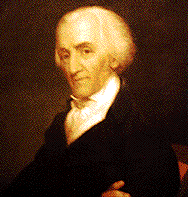Eldridge, Gerry

Eldridge Gerry, the third of twelve children, was born in Marblehead, Massachusetts in 1744 to a Boston merchant whose business exported dried codfish to Barbados and Spain. He received his degree from Harvard College in 1762, and then proceeded to enter his father's business. In 1772 he also became involved in politics, and sat on the colonial legislature. When Boston's harbor was closed down in 1774, Gerry helped deliver relief goods through the harbor in Marblehead.
In 1776 Gerry took part in the Continental Congress, voting for Independence in July of that year. While he specialized in military and financial matters, he was best known for his ambivalence on most issues. He did not trust the military as whole, for example, but became friends with George Washington. At the Constitutional Convention in 1787, he irritated many of the delegates by initially supporting a strong central government, and then refusing to sign the Constitution, which he claimed posed a threat to a republican form of government. Later, in 1789, however, he decided that he agreed with the Federalists after all, and threw his support behind the Constitution. Toward the end of his life Gerry was plagued by poor health and poverty, yet he still accepted President Madison's offer to serve as vice-president in 1813. He died in 1814 at the age of seventy on his way to the Senate. He was buried in Washington D. C. in the Congressional Cemetery.
 >
>